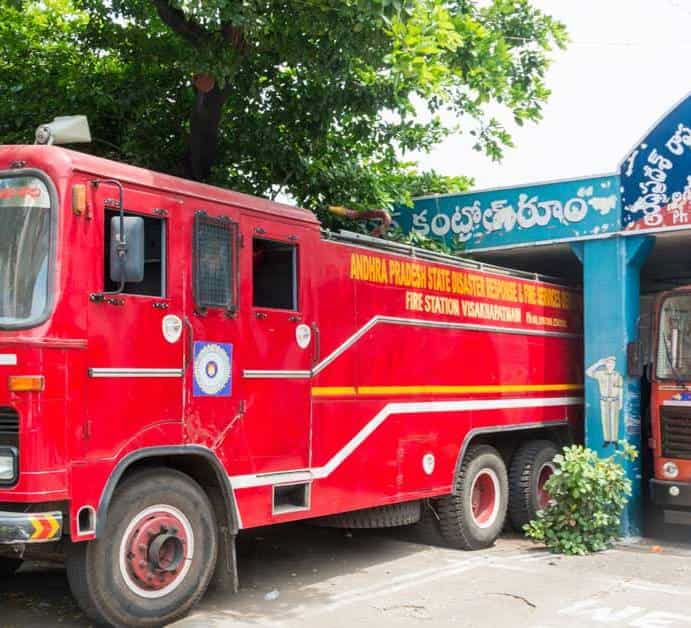They rescue kittens from wells and people from raging fires – they are the everyday heroes who risk their lives because someone else was careless and negligent. Yo! Vizag interacted with the unsung heroes of the city, the Fire Service Department of Vizag, presenting a conversation with J Mohan Rao, District Fire Officer.
Their khaki uniforms offer them pride for what they do as well as cloaks them in anonymity as they go about attending yet another cry for help. Adhering to a gruelling schedule, the fire-fighters work 24-hour shifts on rotation with each shift starting at 9 AM and ending at 9 AM the next day. The next 24 hours are technically rest period but everyone is expected to be on board in case of emergencies. In Vizag, the situation is all the more taxing as the department is severely short-staffed with only 92 firemen doing the work of 154. Often home-guards are deployed as well. But, Vizag has the advantage of having company-owned fire-fighting services; the AP Fire Service Department is often assisted by the fire departments of establishments like Port Trust, Steel Plant and even Navy in terms of men, equipment and fire engines. Thus, our city has, in its service, 32 fire engines manned by the AP Fire Service Department and more than 40 additional fire engines on call for any emergency.
But in spite of the assistance, there is a need for more fire stations. The government’s existing proposal for one fire department per constituency and four per panchayat is inadequate; “The government is making this a smart city, so if funds are provided for more equipment and fire stations, we think we can serve the people better,” says Rao.
Vizag got its first fire-fighting force during the Second World War, albeit on a temporary basis. Back then, as a part of the Madras constituency, the British had one set up in the city -mainly to counteract the Japanese air-bombing. The Madras Fire Service was officially formed after India achieved independence and in due course the Vizag department came under the Andhra Pradesh Fire Service Department.
Your taxes pay our salaries, so we do our best.
On an average, the department gets 10-15 calls a day, with the frequency peaking in winter – when fires lit for warmth and heaters left on overnight create hazardous situations. Forest fires happen more often in summer, while in winters they are often called to handle domestic fires. But industrial fires have no ‘seasonal’ preferences; they are more often a result of explosions due to reaction of chemicals. Though all companies do employ safety precautions, accidents happen. The department conducts fire-safety-audits in industries and commercial establishments to make certain that adequate measures are taken to tackle any fire-emergency. “Just because an institution is fire-safe, it does not mean there won’t be any fire; the safety audit is conducted to ensure that the company is prepared enough to tackle it when a fire occurs”, clarifies Rao.
In the case of any man-made or natural emergency, a call is generally received by the operators manning the 100, 101 and 108 hotlines. The name of the caller, location and phone number is noted and the message is passed on to the fire station immediately – “Usually within a minute of getting the call, we receive the message and 5-7 firemen are despatched on the case,” reveals the DFO as he explains the working of the system. But unfortunately , the department receives a fair number of prank calls as well, “People, especially teenagers think the fire department is so free, they keep calling us. But often we can make out from their voice when the call is a hoax.”
Fire-fighters are not only trained to tackle any kind of fire, they are also emergency responders trained to give first-aid, “A fire-fighter often used to double as a paramedic, till 108 services were deployed in the city” reveals Rao. Connecting with the future generations, the department conducts fire-awareness and basic first-aid sessions in educational institutions. These sessions are generally held in conjunction with the National Fire Service Day on January 21st. “We conduct mock drills even in companies; the more mock drills done, the more awareness it creates and helps people respond better in such emergencies and disasters,” says the DFO. Posted in the Vizag station post the Hudhud, J Mohan Rao became a DFO in 2013. “I have responded to more than 2,000 fires in my career, even risked my life at times. Your taxes pay our salaries so we do our best,” he divulges about his career so far.
Expressing his appreciation for the recent Swachh Bharat drive the DFO remarks, “Fires happen less when there is good housekeeping and when the city is clean without flammable trash lying around.”



Leave a Comment